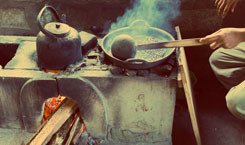Coffee sniffer
The most popular consumer goods at the time of Frederick the Great were beer, tobacco and coffee. After the seven-year war, money was scarce and Prussia's mercantilist focus was on itself. Spending money abroad was considered harmful, especially for luxury goods. Beer was always produced in Prussia, but tobacco, which only grew to a limited extent in Prussia, and above all coffee, which was still quite new at that time, posed a problem.
From beer soup to coffee puree
As a common meal a beer soup was simmering on almost every stove at that time. Depending on the filling of the pantry, the soup consisted of beer, which was drunk by the way by children like water, bread, grain and all kinds of other stomach-filling ingredients. When coffee beans first reached the less wealthy citizens of Prussia, they spread like wildfire. The invigorating effect of coffee as a component of soup, now called "coffee mush", increased the well-being of the population, who until then had eaten beer soup, which was soporific every day and certainly not always tasty. The breweries quickly complained about the business losses they had suffered from the new "worker coke". Also the local malt coffee producers had to struggle with the real coffee. Since coffee could not be grown in Germany, the Prussian king issued an import ban on roasted coffee. His state coffee roastery naturally continued to roast imported coffee for the king, but sold it at prices that ordinary people could not afford.
The birth of coffee sniffers
Together with the ban, the profession of coffee sniffer, also called coffee brewer, was born. Coffee snoopers were usually disabled and were employed at comparatively high wages to snoop around, who would have guessed it. Roasted coffee smells intense and is difficult to hide. The coffee sniffers were allowed to penetrate every house at any time and literally even ladies "feel and smell". The import of green coffee was also banned in 1781. The coffee sniffers were now also charged with locating illegal roasting plants and earned high commissions.
Forbidden is not forgotten
All efforts of Frederick the Great did not help. The smuggling of coffee took on proportions that could no longer be controlled, and his successor finally realized that he had escaped large amounts of import taxes due to the smuggling. He lifted the bans and reintroduced the import taxes; going to the coffee house was thus finally legal again.

